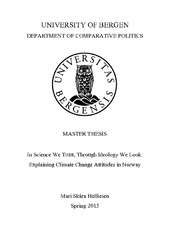| dc.description.abstract | This thesis explores climate change attitudes among the Norwegian public. While previous research on public opinion on climate change to a large degree has focused on scepticism, this thesis focuses on climate change acceptance, belief and support. In addition, previous research has included many and various measures of climate change attitudes as one concept. I have instead made a division between the aspects that lie closely to the scientific knowledge conveyed by the Intergovernmental Panel of Climate Change (IPCC), and aspects that to a larger degree concern political issues, assuming that we are dealing with two main dimensions of climate change attitudes. The aspects that were measured were trend and attribution acceptance and overall threat perception for the scientific dimension and personal threat perception, efficacy belief, and oil policy support for the political dimension. The expectation was to find a divide between the scientific dependent variables and the political dependent variables. The argument was that those aspects of climate change attitudes that lie closer to the scientific findings communicated by the IPCC should be influenced by trust in scientists. On the other hand, the aspects of climate change attitudes that are more in the political sphere should be influenced by political orientation. To test this I used logistic regression analysis with individual data from the Norwegian Citizen Panel (NCP). The results indicate that there is no clear division between the scientific related issues and political issues of climate change. In addition, political orientation is, in general, an important predictor of climate change attitudes in Norway. Trust in scientists also explains climate change attitudes, though not as much as political orientation. People who place themselves to the left on the political scale are more likely to believe in anthropogenic climate change, perceiving climate change as a threat, believing something can be done to prevent harmful climate changes as well as wanting Norway to decrease oil production. The same can be said for people who trust scientists. | en_US |
